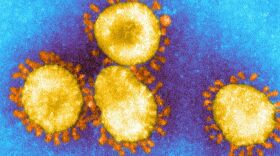BPR is answering listener queries about the Coronavirus in a new segment –Talk to Us: COVID Questions. BPR’s Helen Chickering brings us this week’s answer.
This week's question comes from Emma Rodriguez of Henderson County. “After getting the COVID-19 vaccine, if I get tested for COVID-19, will the test come out positive?”
Good question. To find an answer, we contacted Dr. David Wohl, an infectious disease specialist and researcher at the University of North Carolina. Dr. Wohl helps direct the monoclonal antibody treatment program at UNC Medical Center.
“There are different COVID tests, says Wohl. “So, we just have to make sure we understand what we mean by COVID tests. It is confusing, so let's break it down. Most people who get a COVID test, they're talking about a Q-tip going into their nose and testing for the presence of the actual genes of the virus.”
“Another type of test is for COVID is looking at the antibodies in your blood because if you are exposed to the virus, your body will make antibodies to the virus. In addition, if you get a vaccine - the whole idea

behind the vaccine is to make antibodies to parts of the virus, so you'll have antibodies to that part.”
THE NASAL SWAB “So, swab of the nose, the deeper you go, the better it is at finding the virus. And so deep-down tests are really good. And if they find it, you've got the virus, especially if you are sick or if you're asymptomatic and were recently exposed. There are some people who got COVID-19 and their tests stayed positive for months. That probably is just chewed up virus that's still there and no longer infectious, but let's put that aside. So, if you're sick or recently exposed and someone swabs your nose and tells you that your test is positive, that means they're testing for the actual virus. So, if you get vaccinated, there's no way the swab of your nose would be positive because we're not giving you virus - there's no replicating virus. There's nothing that's going to get in your nose or your throat from the vaccine that would make a test for the virus positive.”
THE BLOOD TEST “If you take a blood test and look for antibodies to the spiky part of the virus - if you got vaccinated, that's going to be positive. It's going to look like you were infected because you're making antibodies to a part of the virus,” says Wohl.
“You can't distinguish that antibody from natural infection versus vaccination. But there are other antibodies that we make when we're naturally infected, including something called the nucleocapsid, which is just an inside part - that's not in the vaccine. The vaccine is triggering your immune system to make antibodies against the spiky outside, not the gooey inside.”
Wohl points out that in people who are vaccinated, that gooey inside - the antibody to the nucleocapsid protein of SARS-CoV-2 - would test negative.
“So, we could look for antibodies in the gooey inside and that would tell us, Whoa, that's negative, but your spike protein antibody is positive - well, that means you've been vaccinated. If you do have antibodies to the gooey part in the middle, that's because you've been naturally infected.”
THE BOTTOM LINE “Most of us won't get blood tests anytime soon - eventually we might,” says Wohl. “We might live in a society, a few months or a year from now where in order to travel to get into a sports complex you will have to show proof of vaccination or an antibody test. But right now, most of us don't need an antibody test of our blood. So no, if you get sick, you're not going to get a false positive test because you got vaccinated - when you do a (nasal swab) test looking for the virus.”
Do you have a COVID question? You'd like answered record a voice memo and send it to voices@bpr.org or use the talk to us feature on the free BPR mobile app.





